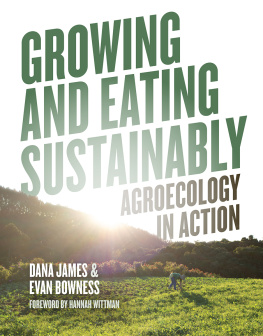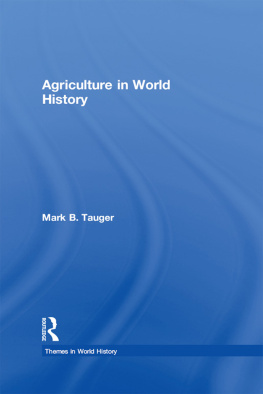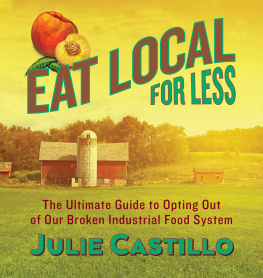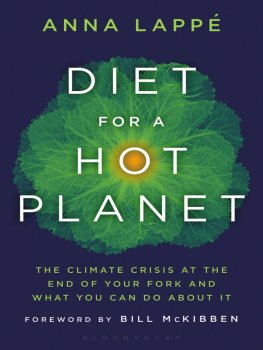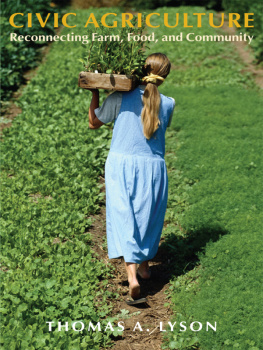All rights reserved. No part of this book may be reproduced or transmitted in any form by any means without permission in writing from the publisher, except by a reviewer, who may quote brief passages in a review.
Fernwood Publishing Company Limited gratefully acknowledges the financial support of the Government of Canada, the Canada Council for the Arts, the Manitoba Department of Culture, Heritage and Tourism under the Manitoba Publishers Marketing Assistance Program and the Province of Manitoba, through the Book Publishing Tax Credit, for our publishing program. We are pleased to work in partnership with the Province of Nova Scotia to develop and promote our creative industries for the benefit of all Nova Scotians.
Title: Growing and eating sustainably: agroecology in action / by Dana James and Evan Bowness.
Names: James, Dana (Scholar), author. | Bowness, Evan, author.
Description: Includes bibliographical references and index.
Identifiers: Canadiana (print) 20210262559 | Canadiana (ebook) 20210262621 | ISBN 9781773634821
Subjects: LCSH: Agricultural ecologyBrazil. | LCSH: Sustainable agricultureBrazil. | LCSH: FoodSocial aspectsBrazil.
ACRONYMS
agreco Associao dos Agricultores Ecolgicos das Encostas da Serra Geral (Association of Ecological Farmers of the Encostas da Serra Geral)
ana Articulao Nacional de Agroecologia (National Agroecology Alliance)
cafo concentrated animal feeding operations
ccr Clulas de Consumidores Responsveis (Responsible Consumer Cells)
cepagro Centro de Estudos e Promoo da Agricultura de Grupo (Centre for the Study and Promotion of Collective Agriculture)
consea Conselho Nacional de Segurana Alimentar e Nutricional (National Council on Food and Nutritional Security)
csa community-supported agriculture
epagri Empresa de Pesquisa Agropecuria e Extenso Rural de Santa Catarina (Company of Agricultural Research and Rural Extension of Santa Catarina)
fao Food and Agriculture Organization of the United Nations
fom mixed ombrophilous forest
funai Fundao Nacional do ndio (National Indigenous Foundation)
ghg greenhouse gas
hhp s highly hazardous pesticides
hlpe High-Level Panel of Experts on Food Security and Nutrition
incra Instituto Nacional de Colonizao e Reforma Agrria (Institute for Colonization and Agrarian Reform)
ipm integrated pest management
lvc La Va Campesina
mab Movimento dos Atingidos por Barragens (The Movement of People Affected by Dams)
mapa Ministrio da Agricultura, Pecuria e Abastecimento (Ministry of Agriculture, Livestock, and Supply)
mmc Movimento de Mulheres Camponesas (Rural Womens Movement)
mst Movimento dos Trabalhadores Rurais Sem Terra (Landless Rural Workers Movement)
ngo non-governmental organization
ntfp non-timber forest products
pacuca Parque Cultural do Campeche
pgs participatory guarantee systems
pnae Programa Nacional de Alimentao Escolar (National School Feeding Program)
psc Planalto Serrano Catarinense (Santa Catarina plateau)
ubc University of British Columbia
ACKNOWLEDGEMENTS
F irst, we are most grateful to the growers, researchers, and community organizers who worked with us during this project and so generously and patiently shared their time, experiences, and delicious food with us two researchers from a foreign university. To those on-the-ground experts we hope that this book honours your stories and the important work that you do, day in and day out. A luta continua.
We extend our deepest gratitude to the Centre for the Study and Promotion of Collective Agriculture (o Centro de Estudos e Promoo da Agricultura de Grupo, cepagro ), a non-governmental organization ( ngo ) based in Santa Catarina, which has been both a partner in the research and a home base for us in Brazil. We are forever appreciative of cepagro s ongoing collaboration, the shared learning, and its members warm hospitality. We are similarly grateful to Natal Joo Magnanti and Carol Couto Waltrich of Centro Vianei, who were equally instrumental in shaping and carrying out this project. We thank Ademir Cazella and a Programa de Ps-Graduao em Agroecossistemas at the Federal University of Santa Catarina, who were the sponsors of our stays in Brazil, as well as Adinor Capellesso of the Federal Institute of Santa Catarina and Juliana Luiz for their support in facilitating portions of the fieldwork. Most of the visits that we made to farms, markets, protests, and other events were the result of connections made through our relationships with these wonderful people and organizations (a number of whom also feature as contributors throughout this book).
We thank our PhD supervisor, Hannah Wittman, for her support of this project and her dedication to community-based research, as well as the team at Fernwood Bev Rach for wrangling the production process, the designers, our copyeditor Amber Riaz, and especially our editor Wayne Antony for his unwavering encouragement, enthusiasm for, and belief in this book. We extend our gratitude to the two anonymous reviewers who provided kind, generous, and constructive feedback on this manuscript. Lastly, we are thankful for the direct funding support provided to this project through the University of British Columbias Public Scholars Initiative, Mitacs International, and the Social Sciences and Humanities Research Council of Canada, and we gratefully acknowledge the land on which this research took place the territories of the Guaran/Mby, Kaingang, and Laklan peoples.
Preface
WHO IS THIS BOOK FOR?
This book is for people who want to learn about agroecology about the concepts, themes, key writings, and grassroots struggles from which it has emerged to become an internationally recognized paradigm for building more sustainable and just food systems. It will be most useful to those who are generally interested in agroecology, food sovereignty, sustainable food systems, and similar topics but are still relatively new to them.
There are many excellent resources on agroecology and related topics, but this book aims to do something a little different in two ways: First, while this is an introduction to agroecology and agroecological transitions, it is presented through stories comprised of vignettes and photos . Agroecology is a way of reorganizing food and agricultural systems, but its also a way of life for people. And sometimes, when learning about such concepts and social issues, the real people doing the work on the ground can get lost in academic abstractions. We think that our use of stories and photographs helps to bring these ideas and the people promoting them to life in a more tangible way.

